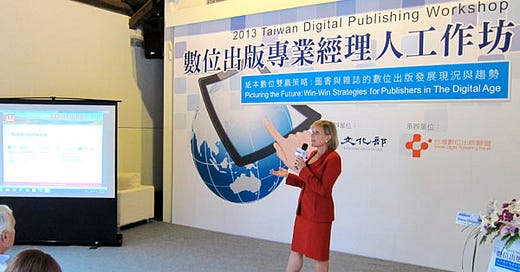I had to read the email twice to decide it wasn’t spam. The message began:
On behalf of the [BIG PUBLISHER] Royalty Department, this email is notification that we will shortly be asking you to complete an IRS form with your tax information. This is required to process payment for royalties earned on the sales of your book(s). We are also asking that you supply your bank information so that we can expedite future payments electronically.
Then there was the name of the book that had a royalty payment to be made, and details about the Docusign form I would receive to give them tax and bank details. The form duly arrived and I completed it.
This is the perfect lede to my new Substack “Section” on publishing because that Big Publisher has no rights to the book. No rights at all. They should not, by legal agreement, have a copy or a file to sell.
But I was not surprised. This is the third time something similar has happened with a major multinational firm. In the past, there’ve been lengthy legal negotiations and settlements, and company executives I used to be friendly with angry because I wasn’t just rolling over. I’ll pick up that story in a letter sometime soon (and I will name the companies involved).
The new section, which I’m calling “Report from the Publishing Trenches” to start, is not going to be relevant to everyone who subscribes to my fortnightly letter. Don’t worry: it’s only going to be for paid subscribers (and for impecunious authors and others who ask for a comp subscription). You won’t get the publishing posts unless you choose to.
There are 3 reasons I’m making this paid-only. The first is that I don’t want some of these stories on the open web. I want to feel free to be frank about the stupidities of this business and some of the bad practice you should know about. Indeed, I have written about a few of these experiences before, but always tending to caution and discretion. No more! I will be naming names and giving some dollar details.
Second, it seems that people who want to be published have lots of disposable income. Or so I was told by the big-deal, big-box company publicist I’ll be telling you about. If he’s right, I might as well get paid, too, for my efforts to shed light.
Third, this will give a bit of privacy to anyone leaving comments. I find that a lot of people prefer to write directly to me, which is fine, but this section might also enable some discussion. (Meanwhile, I’m engaged in a lively discussion about 19th-century English novels on Facebook, started by my post about Mill on the Floss. I had no idea so many people shared my interest in those novels.)
There’s a final reason: I am one of the few writers who seems actually to need to make a living, and being paid will get me to share my experiences as a publisher-author more often.
I am not, however, an expert on publishing in general or on every aspect of publishing. Think of me as a war reporter, writing about the trenches I’ve been stuck in and the battles I’ve lived through. I started my career in London, working in scientific then literary publishing. At 31, I had a successful first book of my own. I moved back to the US thinking I would support myself writing books, fell into reference publishing and a marriage, and then got involved in US-China relations and working with Chinese publishers starting in 2006. Running a small press, I’ve done a bit of everything, from finance to marketing to fighting with Amazon.
I should warn you that this will sometimes get technical. I am a techie. I both love and loathe the IT side of publishing. There are fabulous tools and I use many of them, and I’m always pushing the boundaries, asking a lot of questions of the developers, and working out best workflows. But there are truly grim - and painfully inelegant - technologies around, too, often in widespread use, and I will denounce them from time to time. (Fortunately, I have consistently low blood pressure.) I really get ticked off by the tech professionals who supposedly specialize in publishing but have no clue what it takes to create a manuscript in intellectual or creative terms.
Available now to paid subscribers:
Talking book promotion with Paul Bogaards
Few weeks ago, I drove north to Burlington, Vermont to meet a man who is arguably the best, or at least best-known, book marketing professional in the United States. This followed phone and Zoom meet…
A big-box publisher's effort to reassure authors and agents
This letter was meant to reassure authors and agents, most of whom have horror stories about what the author of the letter calls a “well oiled machine.” It was forwarded to me by a colleague and come…
Future topics
Copyright infringement by multinational publishing companies
Book covers and message making
Amazon and its AI audio book offer
Self-publishing services
Copyright registration
Piracy and Internet Archive
The nightmare world of subject codes
There are a lot of older letters about publishing, too, that are now included in this section. Among them are accounts of earlier battles with Amazon and of my resignation from the board of the University of Pennsylvania Press over their vanity publishing of the board chairman. And of course there will be a few stories about working in China, and other countries.








